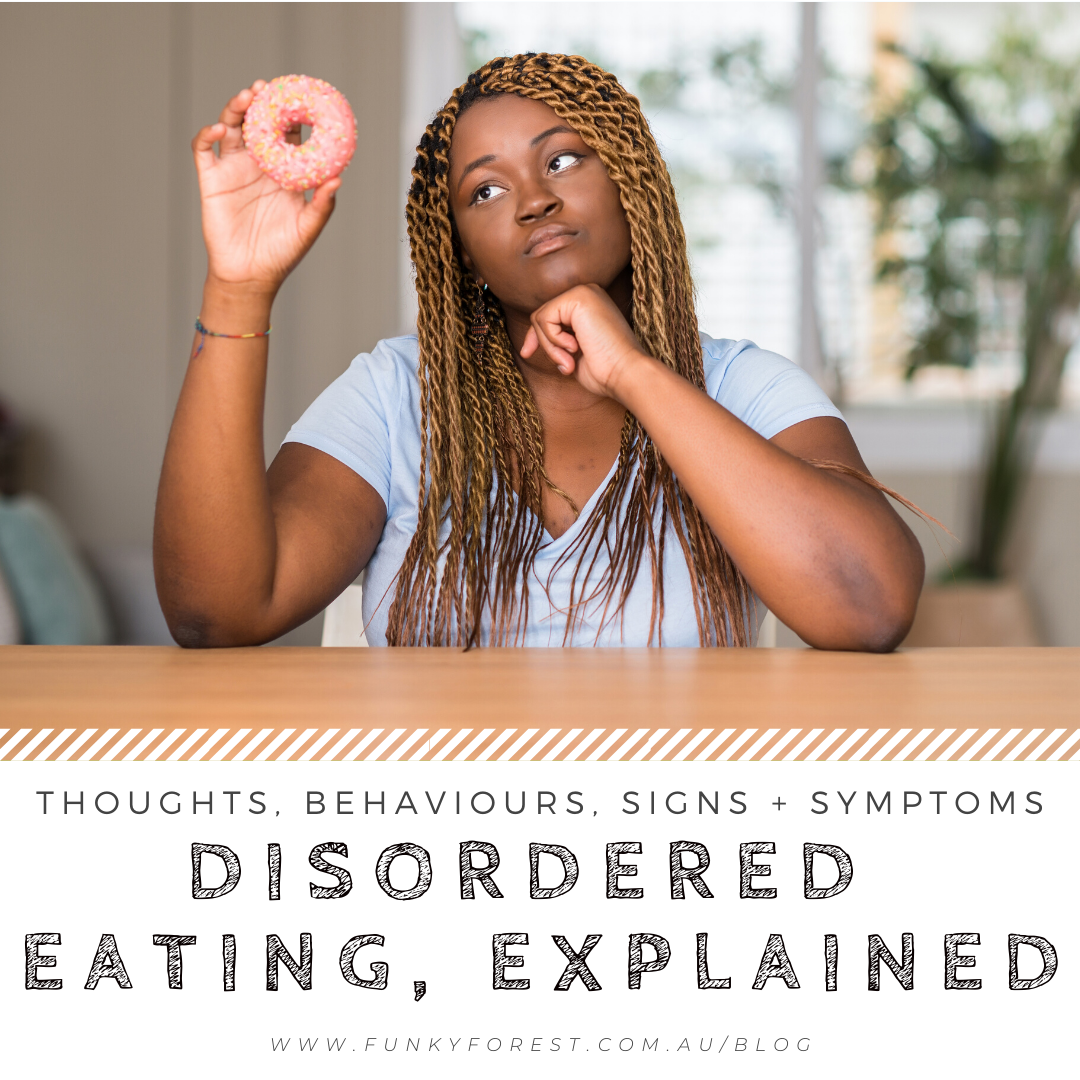What IS disordered eating, actually?
Think of a spectrum of eating behaviours... from "normal" eating all the way through to eating disorders. In between these two polarities lies this grey area where eating isn’t normal but it doesn’t qualify to be a clinical eating disorder like anorexia or bulimia nervosa.
Many health professionals use the term “disordered eating” to include everyone along the disordered-eating spectrum: people with diagnosed eating disorders, as well as those who don’t have a diagnosis but struggle with harmful thoughts and behaviours related to food.
So disordered eating includes this grey area – and it's a far more expansive range of people than the term “eating disorders” (EDs) alone.
There are MANY people who don’t meet the diagnostic criteria for EDs but who still struggle with disordered thoughts and behaviours around food. Behaviours that have a negative impact on their quality of life, and often the lives those around them.
Thoughts + behaviours that are red flags for disordered eating
- Obsessing about body weight: frequent weighing (e.g. every morning) and measuring, body checking in mirrors, pinching body parts, asking others if you look fat, trying to control body weight.. and of course food and eating related behaviours to control weight…
- Overt interest in fad diets: Always wondering about or researching the latest diet fad: e.g. spending hours googling keto recipes
- Counting things e.g. calorie or macro restriction
- Chronic restrained eating: you might not count calories or carb grams - you might not “diet” as such - but you’re always aiming to eat as little as possible, or putting off eating as long as possible.. consciously or otherwise. This one is SO COMMON!
- Skipping meals: Also known as intermittent fasting
- Detoxing: especially if this is regular practice. Common forms of these in the yoga world are juice cleanses e.g. celery juice cleanse, detox diets, and water fasting
- Cutting out whole food groups without medical recommendation or supervision, perhaps cutting out carbs after self-diagnosing a condition like candida overgrowth or being told you have a food intolerance because an IgG antibody test told you so
- Bingeing, which many people do as a result of dieting/restrictive eating. This can eventually push you into...
- Engaging in the cycle of over-eating, and then restricting or dieting, which I describe as The Wellness Diet Cycle (borrowing a term from Christy Harrison) and explain in more detail here
- Fixation on clean eating: Stressing about what foods are “good” or “bad” or “allowed” or “not allowed”? Or what foods are “clean” and which are “toxic”? Clean eating can very easily turn into disordered eating.
- Compensatory behaviours, like eating very little all day leading up to a social dinner in order to “save calories” for it, exercising to burn off food, or vowing to restrict in the future
- Bulimic behaviours, such as purging through vomiting, laxatives, enemas, colonics, or exercise
- Spending money on and using supplements marketed as fat burners or weight loss supplements, including natural ones e.g. Garcinia cambogia
- Avoiding eating out with friends or social gatherings for fear of being made to eat foods they deem too unhealthy
- Using weird tactics to covertly eat less when you ARE forced to be in a social eating situation
- General fear, anxiety, or feeling out of control around food.
As you can see, many of these are so common we’ve come to think of many of them as “normal”. After all...
Isn’t it normal to feel guilty if we don’t eat 100% clean?
Isn’t trying to burn off any transgressions at the gym or in a hot yoga class, the right thing to do?
Maybe I don’t say yes to going out to ice cream with friends for the 4th time, but that’s only because I'm trying to get healthy…. aaaand not mess up my macros?
Surely it’s ok to do a seasonal 3-day juice cleanse to reboot, and a bit of weight loss wouldn’t hurt?
Nope, none of these thoughts and behaviours are normal, and in fact they may be red flags for disordered eating.
Signs + symptoms THAT ARE RED FLAGS FOR DISORDERED EATING
Additionally, here are some physiological signs and symptoms that may indicate disordered eating:
- Period and fertility issues: Irregular periods (missing periods), amenorrhea, or fertility problems like problems conceiving
- Loss of sex drive: in men and women
- Digestive disturbances e.g constipation, IBS, food intolerances which ironically are often caused in the first place by food restriction
- Fatigue, poor sleep, and mood issues
- Loss of muscle mass, a phenomenon known as sarcopenia or where muscle mass shrinks and/or becomes "saggy"
- Hair falling out or becoming brittle
- Skin and nails become less lustrous and weaker, and may grow more slowly
- Poor immunity, i.e. getting sick more often than usual
- Poor sports performance or higher incidence of injuries and having to opt out of meets and comps because of it.
As you might be realising, these signs of disordered eating are often used as reasons to go harder or stricter with the food restriction or diet, rather than warning signs that the disordered eating has gone too far.
Hopefully this gives you a starting point when screening your clients, yoga students or yourself for disordered eating.
Does this resonate for you? To begin the deep dive into this work, you can get my FREE e-book, A Modern Yogi's BS-free Guide to Wellbeing by clicking on the ebook below.
Casey



































 RSS Feed
RSS Feed



